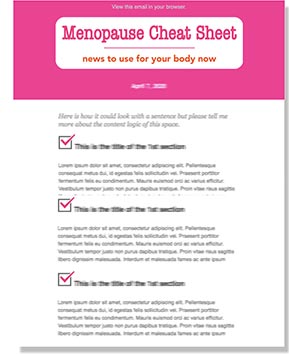
We rationalize that anyone can have dry eyes or hair, but, many people believe, only women who are getting old have dry vaginas (which isn’t true). And, it’s so easy to think that you’re the only one who has the problem.
That couldn’t be farther from the truth.
According to the North American Menopause Society (NAMS), a whopping 75% of all post-menopausal women experience some degree of vaginal dryness.
And most suffer in silence.
Many women are embarrassed to discuss it with friends, partners, and even doctors, so we often don’t get the help and treatment we need. (For the latest info and tips on how to start the talk with your physician, a good site to visit is vaginaldiscomfort.com.)
This common condition, which occurs as we lose estrogen levels after menopause, can often have a negative impact on the relationship we have with our partners. A recent survey underscored that many women and men simply give up on sex altogether, or if they do engage, it’s painful.
But the truth is, it’s not just our sex lives that suffer as result of vaginal dryness. Our long-term vaginal health is at stake.
Unlike other common symptoms of menopause, like hot flashes and night sweats which eventually go away, vaginal dryness usually gets worse over time if left untreated. What’s more, the condition can lead to other health issues, which can have a huge impact on our quality of life for many years.
According to one study, it’s estimated that a woman who ignores these symptoms and does not get treatment for vaginal dryness could suffer for more than 1/3 of her life.
It’s every woman’s right to have a healthy and loving sex life, whatever her age. But the issue of vaginal dryness transcends sex. It’s all about our long term health. Don’t be silent about this anymore.
Check out this interview I did with menopause expert and endocrinologist Dr. Margaret Nachtigall, where she answered my questions about some of the most common, but least discussed, symptoms of menopause:
Subscribe to The Best of Everything After 50 Web series on the AARP YouTube Channel! For more tips on living your best life after 50 (or 60, or 70…) check out bestofeverythingafter50.com. Find Barbara on Facebook or on Twitter at @BGrufferman.






























































One comment